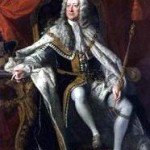Robert Walpole, the First Prime Minister
Category: 18th century The king could appoint any person he wished to his government. George I found it convenient to select influential members of Parliament to it. Such was the case of Robert Walpole.
The king could appoint any person he wished to his government. George I found it convenient to select influential members of Parliament to it. Such was the case of Robert Walpole.
Robert Walpole became a Member of Parliament in 1701, and soon his hard work and talent were recognized. The support of King George I helped him rise to great influence. An experienced politician who had spent 20 years in Parliament, Walpole became the First Lord of the Admiralty and Chancellor of the Exchequer.
That made Walpole the king’s chief minister. In part because George I could not speak English and in part because both he and his son, King George II, were often in Hanover, which they continued to rule, Walpole was able to build up and dominate a government machine. He presided over an informal group of ministers that became known as the Cabinet, and he controlled Parliament.
Being in power, Walpole made it his business to dine with each of the chief ministers or spend a night with each of them at their country houses. Having prepared the ground in this way he would call a meeting of the efficient Cabinet. When a question had been squared, the formal Cabinet could be summoned. But the king had to be persuaded to take the advice thus carefully prepared.
This was not a simple task with any of the Georges who reigned Britain in the 18th and 19th centuries. William III had made his own policies. He was prepared to adjust himself to English vagaries in the interest of his European strategy. Anne made everybody respect her views on policy and on appointments. George I was stupid and ignorant, but he had the interest of his native Hanover at heart.
When with the Hanoverians the king of England was also the king of Hanover, and Britain lost in foreign policy some of the advantages of being an island. The British got a frontier in the heart of Europe.
George II had an astonishing knowledge of the complexities of European politics. Ministers knew that it was essential to have the support of their royal master. He was the head of the living constitution, and they had enough sense to know that constitutions are not made but grow. But if the constitution were to be preserved, ministers had to be brokers of political power who could tell the king what it was possible for him to do. There had to be at the head of affairs a man who was both the “Minister for the King in the House of Commons” and the “Minister for the House of Commons in the Cabinet”.
The task of such a minister would have been impossible had not the sessions of Parliament lasted only four or five months in the year and if the work of Parliament had not been limited mainly to the discussion of foreign policy and its cost, with major legislation comparatively rare. For the other seven or eight months of the year the government could devote themselves to diplomacy, patronage, and administration.
Walpole has been regarded as Britain’s first Prime Minister, as this job did not exist before him. He helped create it by taking on the major responsibility for getting things done in the House of Commons. Being a Whig, Walpole was supported by other Whig Members of Parliament, and they were usually able to defeat their political opponents, the Tories. Walpole was accused of corruption, as he used to give well-paid jobs to those who supported him, and as time went on, Walpole grew less popular. But even in the prime of his career his influence had limits.
Walpole was confronted with a brilliant opposition. This was based not on the influence of the Court alone, but also on an appeal to the House of Commons and the new vitality of public opinion nourished by a brilliant political journalism. After 1726 it was led by Bolingbroke and William Pulteney, but Walpole was not a person to be dislodged easily.
Opposition in the House of Commons was not easy to organize. The country gentlemen would not always stay on in London to press an attack in the Commons. They had their own divisions. There was a small group of Jacobites who lived in a dream world of pre-1689. There were rugged individualists and urban radicals. There was a group of Hanoverian Tories suspicious of Jacobites, Whigs, and radicals. There was also the influential group of angry young men who said that a worthless politician was forcing a minority policy through the House of Commons by means of corruption.
Bolingbroke may have sensed the danger of corruption in an elected assembly and the chasm which might grow between an oligarchy and public opinion. But Bolingbroke did not understand the new political system which Walpole was fostering — a system in which Parliament would be the most important tool for political work and a tool which had its cutting edge from the presence in it of ministers of the Crown who had the support of their royal master and of the House of Commons too.
